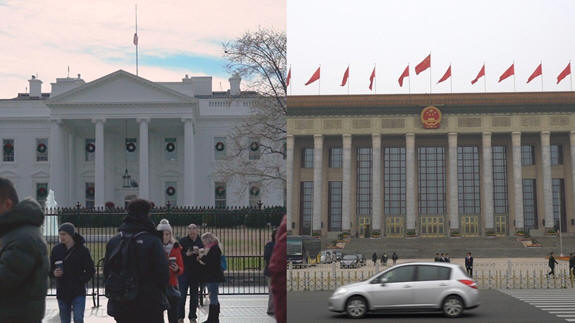www.aljazeerah.info
Opinion Editorials, June 2020
Archives
Mission & Name
Conflict Terminology
Editorials
Gaza Holocaust
Gulf War
Isdood
Islam
News
News Photos
Opinion Editorials
US Foreign Policy (Dr. El-Najjar's Articles)
www.aljazeerah.info
Expect More Stock Market Volatility as US Presidential Election Nears, If Tariff Threats Heat Up Again By Sylvia Sheng SCMP, June 19, 2020 |
 |
 |
|
The greatest risk to seesawing markets is an escalation in US-China tensions. While rhetorical sabre-rattling is unlikely to unsettle investors in the near term, an increase in tariff threats closer to November could see renewed turbulence
Stock prices have seesawed recently as market sentiment is being pulled in different directions. On the one hand, worries about a second wave of Covid-19 infections are dampening spirits.
June 12 was the worst day for stock markets since the March sell-off, with the S&P 500 index slumping 5.9 per cent and Europe’s Stoxx 600 index tumbling 4.1 per cent. Many pointed to the rise in US infections across states such as Texas and Florida, which had loosened their lockdowns early, as a trigger for the sharp drop in global equities. Stock markets also opened weak on Monday amid reports of a fresh Covid-19 outbreak in Beijing linked to the city’s biggest wholesale food market.
On the other hand, recent economic and policy developments have boosted hopes, supporting stock prices. The economic outlook is improving as disruptions from Covid-19 ease slightly. High-frequency data suggests that April marked the trough in economic activity, with better data evident in May across major developed market economies. A major surprise for markets this week was the strong rebound in US retail sales in May. Voya Employee Benefits Sponsored by Voya Financial READ MORE Policy support was also further strengthened. The US Federal Reserve bolstered the market mood when it announced plans to purchase corporate bonds on Monday, highlighting the seemingly unlimited policy support from central banks. The US government is also reportedly pushing for a US$1 trillion infrastructure spending programme .
In addition to a resurgence of coronavirus infections, a key risk to stocks is the escalation of US-China tensions. Rhetoric has grown tougher on both sides and a number of US actions on the technology and financial fronts seem likely to further strain relations between Washington and Beijing. However, deteriorating relations have yet to meaningfully dent the markets. On the trade front, China is unlikely to fulfil the import target laid out in the phase one deal that was agreed in January, but both the US and China have incentives to keep the deal alive in the near term.
While China has delivered on some of its commitments on intellectual property rights protection and financial sector liberalisation , it has fallen notably behind in reaching its import purchase target. On the goods side, China imported only US$22 billion worth of goods from the US in the first four months of this year (around 14 per cent of the annual purchase target this year). Salmon import ban and partial lockdown for Beijing after new Covid-19 cases in Chinese capital
Over the near term, the US may want to avoid hiking tariffs, given the risk that they could further damage the US economy and potentially derail the nascent recovery. Still, as the US presidential election draws near, political considerations are likely to outweigh economic factors in Washington, raising the chances of tariff threats. China also has a strong incentive to maintain the phase-one deal to spare its labour market from the pressure of higher US tariffs. With the unemployment rate in cities is close to the government’s target of 6 per cent in May, Chinese policymakers are focused on maintaining labour market stability.
Even without tariff increases, the US is likely to further tighten export controls in technology and increase restrictions on financial investment in Chinese companies. China’s response to the recent escalation in the tech and financial areas has been relatively mild – there is only a limited risk of these disputes spilling over onto the trade front.
Tariff worries have tended to unsettle stocks whereas broader US-China rhetorical sabre-rattling is more likely to be shrugged off by investors, based on experience of the past two years. This explains, in part, the relatively muted stock market reaction so far to the re-escalation of US-China tensions.
In the near term, the likelihood of US tariff hikes is low and investors are likely to look past simmering US-China squabbles in technology and financial sectors. But, as we get closer to the US election in November, market focus will shift back to US-China relations and volatility could kick in as tariff threats heat up.
***
Sylvia Sheng, vice president, is a global strategist on the multi-asset solutions team, responsible for communicating the group's economic and asset allocation strategy, based in Hong Kong. Prior to joining J.P. Morgan, she worked as a China and Asia economist at Bank of America Merrill Lynch. She has a PhD in economics from the University of Cambridge and an MPhil and BA in economics from the same university.
***
Share the link of this article with your facebook friends
|
|
|
|
||
|
||||||


